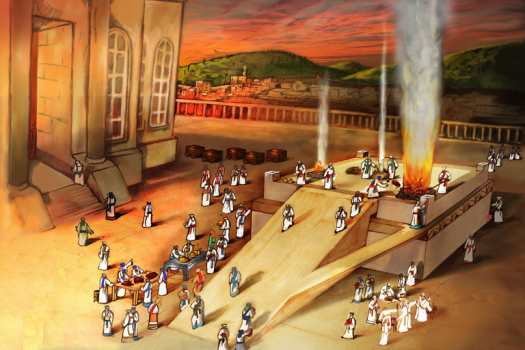
Vayikra: Love in All the Gross Places
“This is a book about love” Peggy Noonan begins her book on 9/11. It’s a captivating read: raw, unedited. Written at the time and in the aftermath of when jets crushed towers into rubble and white smoke smotered Manhattan and death choked the streets for days. Its reads battlefield, not memorial. And yes, with all the terror and bleeding and gory horror, she’s right – it is a book about love. Across the pages she sifts through her mind, her conscious, her life, her generation, our ethos. And she brings us through with a generous spirit.
I don’t remember the title and I read it years ago, and since this isn’t a review of her book, I’m purposefully not googling. But her opening words came back to me this week.
The rhythm of Jewish life, whether most Jews recognize it or not, is set by the parsha: the reading of the Torah as it cycles through the year. And this week we come to the book of Vayikra, named Leviticus in Latin, because it speaks of the service of the Levi, the tribe of Moses, who guarded and nurtured the Temple mount. the Bais Hamikdash.
It doesn’t sit well with Western sensibilities. It talks of the sacrifices (offerings would be a better translation) that were brought — animal sacrifices — the crop of the bird, its wings and how to slice its throat. The livers and spleens of cows, the quarters of sheep. Blood, guts, livers spleens and more blood guts livers spleen.
It’s hard enough to digest (interesting term) the gory details, we, raised in the refined echelons of higher culture where the physical is not becoming of the religious. So the Occidental in us cannot fathom what this all has to do with coming close to the Creator of all things. Until we realize He is their Creator too, and then a bit of reason seeps through into this meat-packing joint and we hear the echo of the shadow of symmetry that the beating heart of matter must too come unto its source and interface with the Infinite. But I digress.
What I was thinking is — this is not a book about guts and blood. This is a book about love. That this holy mountain, this interface that the Almighty appointed, where heaven touches earth and earth can feel the breath of heaven, that this place exists, is an act of love.
The Hebrew name of the book, Vayikra, is indicative of something the English-Latin translation doesn’t capture. Vayikra, which literally means ‘and he called’, is a term of endearment, the classics point out. It is an expression unique to the Living G-d calling His people. To the prophets of others the term used is vayikar, and he called – same words, same meaning, vastly different connotation. Vayikar is, cold, distant, by chance, happenstance. Vayikra is love. When G-d calls to Moses He calls in love, when G-d commands Moses He calls in love, when G-d says speak to my people, the children of Israel, say to the children of Israel, command the children of Israel, He calls in love.
If your wife senses you stopped off the last minute and picked up a bouquet on sale, she won’t be impressed. If she knows, you spent time, compared, pestered the saleslady or her sister with questions, she’ll love them, even if you have no taste. Because detail means you care. It means you love.
This is a book about love. And we respond with love, even if we don’t mean to. Why else would we open the book again to talk about livers and crops?
For all the explanations as to why the gore, I think we’ll be left with more question than answer. That’s just the way it is, we don’t sense G-d in in the back of the butcher shop, it is not a sacred space in our minds, in our experience, in our expectations. But then, what do we really know, in the intimate sense of knowing, of the physical: of its innate holiness, of its spiritual beauty?
No matter. Who cares? This is a book of love.












